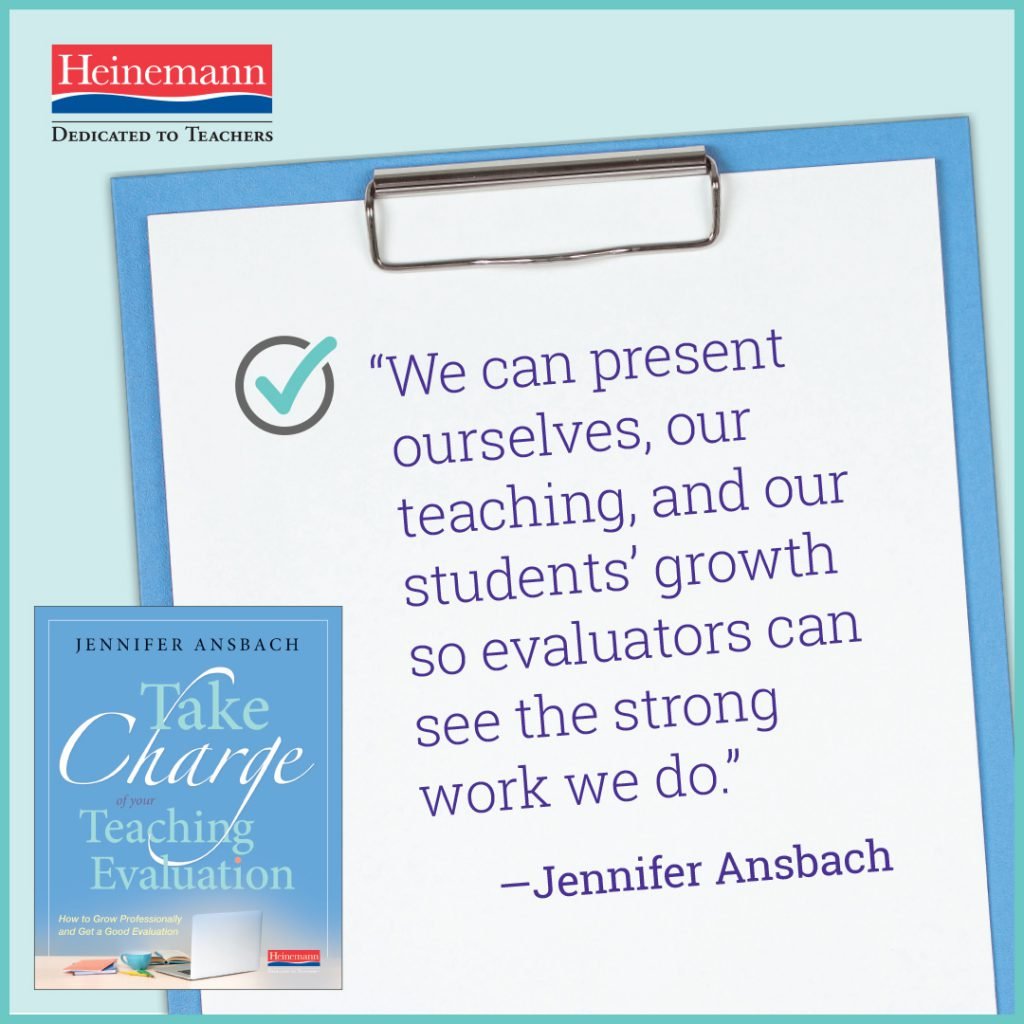
The following is an excerpt from the introduction to Take Charge of Your Teaching Evaluation by Jennifer Ansbach
Tell Your Story
In 2005, I attended a summer teaching institute for the humanities. Over the course of the week, the twenty-five participants grew to learn more not only about the subject matter we were studying but also about the teaching contexts that vary so widely in our state. At the time, I was teaching in one of my state’s neediest districts, and I saw my attendance at the institute as a way to be certain I was doing right by my students. At the end of the week, as we were sharing ways we could use what we had learned to create new units for our students, a woman who was a supervisor at a nearby district said to me, “Wow. I didn’t know your district had teachers like you. I would have hired you.”
This comment stunned me. First, I realized that she assumed I was teaching in my district because I had been turned down by other districts. But I had applied only to the district I was teaching in: I had been looking for a change and a challenge. Second, in that moment I understood how the larger world saw my colleagues and me—because we taught in what was labeled a failing school district, we were failures, also.
Perhaps you have a similar story, one in which you’ve seen someone make an unflattering, inaccurate assumption about your work or about our profession. If so, you’ve likely had the same stunned reaction I had. As professionals, we care what people think of us. We want to do a good job. We want others to know we do a good job. If we want others to truly understand our work—individually or as a profession—we must take control of the stories we tell ourselves and others.
Right now, many teachers feel as though they have little control in their professional lives. The outside demands of teaching with changing standards, high-stakes tests, value-added models, teacher accountability, and increasing paperwork to document needs, remediation, and growth overwhelm even the most easygoing teachers. Evaluations can add to the stress, but they don’t have to.
Instead, we can embrace the evaluation tools as opportunities to redefine how we see ourselves and our students. While many outside voices seek to label teachers as ineffective or to repair their “deficiencies,” teachers themselves can instead amplify the positive work they do inside and outside the classroom.
We can see evaluations as someone else’s judgment . . . or we can see them as a way for us to show what we can do. Just as we encourage our students to use assessments to showcase their learning, we need to shift our thinking about evaluations as a way to reflect on our practice and showcase our own growth and learning.
This is not to say that current evaluation models are desirable or effective or even fair. Instead, it is a reminder to focus on the parts of the evaluation we can control. When someone visits our classrooms, we have the opportunity to let them see how amazing our students are and help contextualize the learning and growth they can see there. When we are asked how we have grown as professionals, we have a chance to share our own learning and invite our administrators and colleagues to learn with us. How much of your professional self are you sharing regularly? After working alongside me for eight years, a woman who went from being a colleague in my department to my administrator was surprised to learn I peer-reviewed articles for a content-area journal. Despite years of chatting and collaborating on curriculum together, somehow this part of my professional life had not come up. We need to own those parts of ourselves as threads of the larger narrative of who we are as teachers.
♦ ♦ ♦
To learn more about Take Charge of Your Teaching Evaluation, and to download a sample chapter, visit Heinemann.com.
♦ ♦ ♦
 Jennifer Ansbach (@JenAnsbach) was told by nationally prominent educator, Jim Burke, “if you were any more reflective, you’d be a mirror.” A National Board Certified™ English teacher, Jen works in a continuous cycle of professional improvement: identifying students' needs, improving her practice, finding applicable PD, and documenting her work. She also supports other teachers’ professional journeys by serving on her local and district PD committees and as her local union’s PD chair. She hopes that Take Charge of Your Teacher Evaluation will help teachers overcome the feeling of powerlessness that evaluations create and finally be recognized for the effectiveness of their daily practice.
Jennifer Ansbach (@JenAnsbach) was told by nationally prominent educator, Jim Burke, “if you were any more reflective, you’d be a mirror.” A National Board Certified™ English teacher, Jen works in a continuous cycle of professional improvement: identifying students' needs, improving her practice, finding applicable PD, and documenting her work. She also supports other teachers’ professional journeys by serving on her local and district PD committees and as her local union’s PD chair. She hopes that Take Charge of Your Teacher Evaluation will help teachers overcome the feeling of powerlessness that evaluations create and finally be recognized for the effectiveness of their daily practice.



